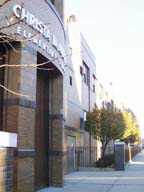A state-appointed team is expected to recommend that the city’s schools retain an elected school board, but add to it four state-appointed members when the state ultimately leaves the district. You can bet that not everybody’s happy with the idea.
“It’s absolutely ridiculous to have four people from the state come in here,” said Jersey City Education Association president Tom Favia, of the union that represents Jersey City teachers, last week. “You nullify the election by putting four state-appointed people there.”
The decision to go for the state appointments came after multiple proposals, votes, and counter-proposals at a public forum two weeks ago. Representatives from the mayor’s office had advocated a mayor-appointed, City Council-approved board, while other members were seeking a purely elected body. The two factions, said sources, could not agree on a hybrid mayor-appointed/voter-approved board.
An educational transition team, made up of 14 city residents and four non-voting members, decided on the board’s composition when it met following the public forum, said sources on the team. The recommendation must now get approval from state Education Commissioner David Hesbe and the state legislature. Hesbe was not available for comment last week.
A decision is expected to be announced by Dec. 1.
The current school board is comprised of nine elected members. Prior to state takeover in 1989, the mayor appointed board members. Under the expected recommendation, elections would continue to be held in April. The mayor’s representatives had recommended moving elections to November.
Transition team member and Council President Tom DeGise, an advocate of mayoral appointments and a candidate for mayor, was exasperated that the state would remain linked with the school system should the recommendation be accepted.
“It’s more state intervention and state watchover,” he said.
Notables on the transition team include DeGise, Board of Education President Suzanne Mack, Mayoral Chief of Staff Tom Gallagher, Board of Education member Willie Flood, and Abegail Douglas-Johnson, the vice president for academic affairs and dean of Hudson County Community College. It is chaired by former Board of Education President Greg Butterfield.
In 1989, Jersey City became the first ever state-controlled school district in the country. Cities like Newark and Paterson subsequently fell under state watch in the ’90s.
Results have been mixed in the city. Student test scores have risen, but not appreciably. Attendance is still low, and many complain that parental involvement is minimal. To its credit, the state-controlled district has made attempts to get parents more involved.
For Anthony Cucci, mayor at the time of the takeover and a current Board of Education member, the issue is not board composition, but improving the quality of the schools.
“How about talking about curriculum?” he said last week. “What are you talking about to make us achieve more?”
This is a matter that likely will not die easily. Favia promised to lobby legislators to vote against the recommendation.
“Elect nine people and make them accountable for the school system,” he said. “It’s good enough for 589 other districts in New Jersey.”
